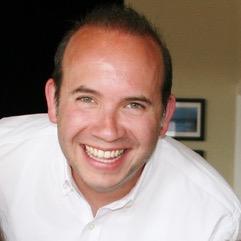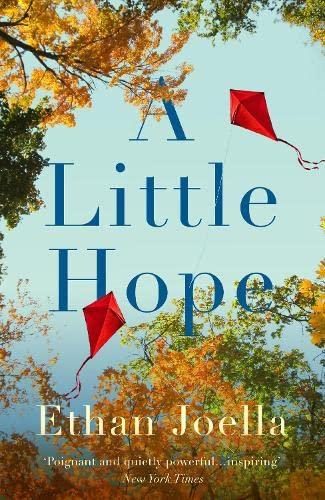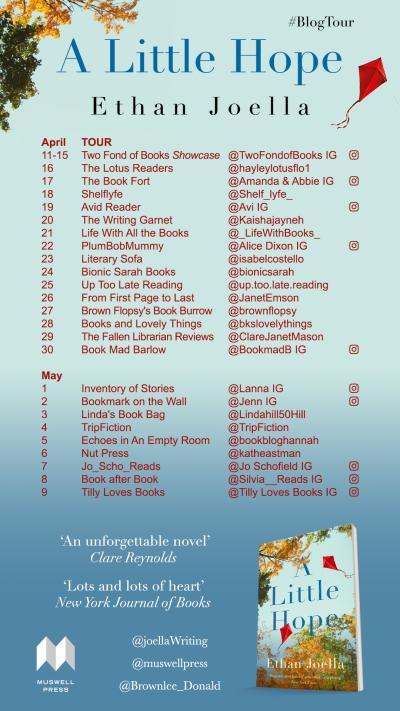 Now it feels like spring is here to stay and I hope you’ve enjoyed some sunshine and time off over the holidays. Today I’m joined by fellow Muswell Press author Ethan Joella whose debut novel A Little Hope is about to be published in the UK following its success in the States. I hope we’ll soon have the pleasure of meeting in real life but in the meantime, it’s an honor to host Ethan’s very personal piece on the emotional inspiration behind the book.
Now it feels like spring is here to stay and I hope you’ve enjoyed some sunshine and time off over the holidays. Today I’m joined by fellow Muswell Press author Ethan Joella whose debut novel A Little Hope is about to be published in the UK following its success in the States. I hope we’ll soon have the pleasure of meeting in real life but in the meantime, it’s an honor to host Ethan’s very personal piece on the emotional inspiration behind the book.
None of this would be happening if it weren’t for our wonderful publicist Fiona Brownlee urging me to move it to the top of my TBR pile. Unsurprisingly a lot of people are actively looking for heart-warming and hopeful reads at the moment but when it comes to novels with an uplifting premise I’m a tough nut to crack despite not actually being hard-hearted (I hope you knew that). Find out how Ethan won me over in my review at the end.
When my mother-in-law was diagnosed with a deadly form of leukemia, the whole thing was unthinkable. I thought, my wife can’t lose her mom. Ann would need to survive, we would need to fix this. Rebecca and I were a couple who were good at fixing things—both Type A personalities, both over-achievers.
But after hospitals in Philadelphia and New York City, chemo, radiation, and experimental treatments, the disease prevailed. Her funeral was on the coldest day I can remember. The ground was frozen, and the sky above us was clear blue, with a few snow geese punctuating the service.
A month later, in February, we drove our daughters to Ocean City for something to do. The weather was unseasonably warm, so we thought we’d walk the long boardwalk. The wind was cold, but people were out on bikes. The boardwalk was half summer and half winter: some stands open and some forgotten. We walked past arcade game music and boarded-up rides, and there were fake dinosaur bones in the sand. I could not stop this feeling that we were limping.
Every so often, I looked at Rebecca, who was quiet but brave. Losing her mother had collapsed us. The world was not right without Ann. I kept thinking about the initial diagnosis in March and how I thought it was impossible that she could die. I felt foolish, rotten for telling Rebecca her mom would be okay. Ann’s death had felt like simultaneous loss and failure.
We kept walking and finally got to the end of the boardwalk, where the ocean meets the bay. The view was worth the walk and the cold. The sun rested on the water. The waves were gentle. I looked at Rebecca, and realized we were doing the impossible. We had lost someone we couldn’t live without, as Anne Lamott says. I missed hearing Ann’s voice and laugh. I missed when Rebecca would call her and tell her we got to Delaware safely. I missed the way we pulled up to Ann’s house with a new car and the excitement she would have.
On the boardwalk, we turned back, and the wind was easier in this direction. It was then that at I noticed all the benches. They were brown and each had a plaque.
For Lila who loved seashells in the morning and the boardwalk at night.
For our dad Roger Black who is always in our thoughts.
For Bob and Lucille: The beach isn’t the same without your smiles.
There was grief everywhere. It was like the Buddhist parable about the mustard seed my professor told us about in college. Every house has suffering, and this is part of life.
The writer John Dufresne talks about writers facing the sadness and nobility of life. The sadness that we know we will all die but the nobility is that we still do all this anyway: fall in love, hold a child up in the air, get wet in the ocean, our eyes watching for dolphins and banner planes in the distance. I started to think about getting back to writing.
I had always loved to write, and I had a handful of novels I’d completed that would get me close to an agent, close to a good publisher but never any further. With graduate school and young kids and working in two different states, my writing was the first thing I would cast to the side. But that day, I thought of the carrying on we all do, the way we need to do the things the people we lose can’t do anymore, and I heard a phrase in my head: This is how we love them when they’re gone.
I thought about Ann not being able to vote in the upcoming November election. I thought about the fact that her house was still decorated for fall because she left home and didn’t come back. I thought about life as being something that rights the wrong, that the living must fight for the injustice of the dying and the dead.
I didn’t know how long it would take, but I knew that day I would write a novel that focused on love and loss and the things we do to bear it.
Our car sat by itself in its parking space in the street between two closed hotels, and our daughters waited by their doors. In the distance, a stray cat scurried by, and the music from a faraway car radio played something with too much bass. Rebecca and I sighed and looked at one another. We were carrying on the best we could, our daughters needing us to keep going. And we would try to live well. For Ann and everyone else whose names were on the benches.
Thank you to Ethan for this eloquent and poignant insight into the background to his debut novel. It made me think about how my father’s death when I was 24 consciously influenced the way I would live my life.

The setting for this novel is a small, conservative fictional town in Connecticut which is reflected in the cast of characters and the events, major and minor, that play out. It reminded me of Elizabeth Strout’s Olive Kitteridge and praise doesn’t come much higher. The individual stories and personalities are interwoven with a skill and delicacy that extend to the book’s emotional barometer; the characters felt real, flawed and vulnerable and I was invested in their joys and sorrows. As you probably guessed from my intro, these are handled in a way that create connection and depth without being excessively sentimental, which is hard to pull off. A couple of the storylines tugged at my heartstrings, especially that of Luke and his mother, the Olive figure.
Overall it’s a lot sadder than I expected, in a good way. I admire the author’s directness in engaging with death and sadness as normal parts of life when they are so often the subject of unhealthy taboos. But to avoid giving the wrong impression, this is not a depressing book and the promised hope the reader is holding out for arrives from satisfying and unpredictable directions. My 20-year-old son and I really enjoyed discussing A Little Hope which, like all good fiction, resonates with different people in different ways. I can imagine book groups all over the country having their own versions of the conversation we had, just as they have in America. Some things are universal.
*POSTSCRIPT*
In contrast to the general scheduling on the blog this year, I’ll be hosting another fantastic guest post in less than a week’s time: come back on 27 April for Melissa Fu’s Writers on Location on Western China, home to some of the settings of her stirring debut novel Peach Blossom Spring.


